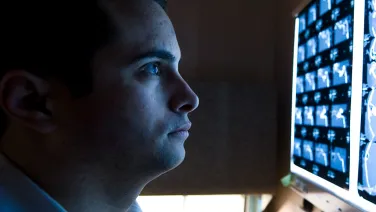
Neuroscience grad has research on the brain
When you ask Ayla Venslovas about her fondest memory from her Master of Neuroscience at ANU, she says, without hesitation: doing the assignments.
This might sound like the kind of thing you say only after your assignments are all behind you and you’re ready to graduate, but Ayla actually felt this way at the time too. In fact, she loved the neuroscience research essay subject so much, she did it twice.
“When you start researching a topic, it's overwhelming because there are hundreds of papers to read,” she admits. “But when you get to the towards the end of your research, you're really able to critically evaluate what you've done and what other people have done, and then all of a sudden—there it is! You see what it is that you’re trying to find and it all comes together.
“It’s so rewarding because you put so much effort into it, and then it just clicks.”
Ayla’s research papers were on how retinal cells communicate with each other, and glutamate recycling in the brain. The opportunity to have completed this complex research is part of the reason she says she’ll be graduating from her master’s program with confidence in her expertise in the field.
The other, she says, is that she was treated not as a student, but a colleague, by the academics at the John Curtin School of Medical Research.
“It's exciting when you’re in the labs and you hear two scientists talking about something and you realise you understand what they’re saying.
“Being around all the research, in that kind of environment, just feels smart.”
Ayla says she was drawn to neuroscience because of the complexity of the nervous system. Trying to understand it, she says, is like “unravelling a big knot”.
“I studied medical science as an undergrad, and even then, I always kept going back to the brain. I just wanted to know more about it, because it makes you who you are. All our individual nuances are in there.”
Studying the brain has changed her perspective on her own, too, Ayla says.
“Like many people, I have anxiety so it's kind of nice knowing what's going on in there, on that fundamental level when I’m getting that physiological response to it.
“It helps me talk myself down from the anxiety, to know that as emotional as it feels, it’s all in the brain.”
When it comes to emotions, Ayla says she’s conflicted in her feelings about graduation.
“I’m excited, yes, but I’m also a bit sad that it’s over. If I could do this master’s forever, I would do it.”
And it doesn’t sound like just something you say.

